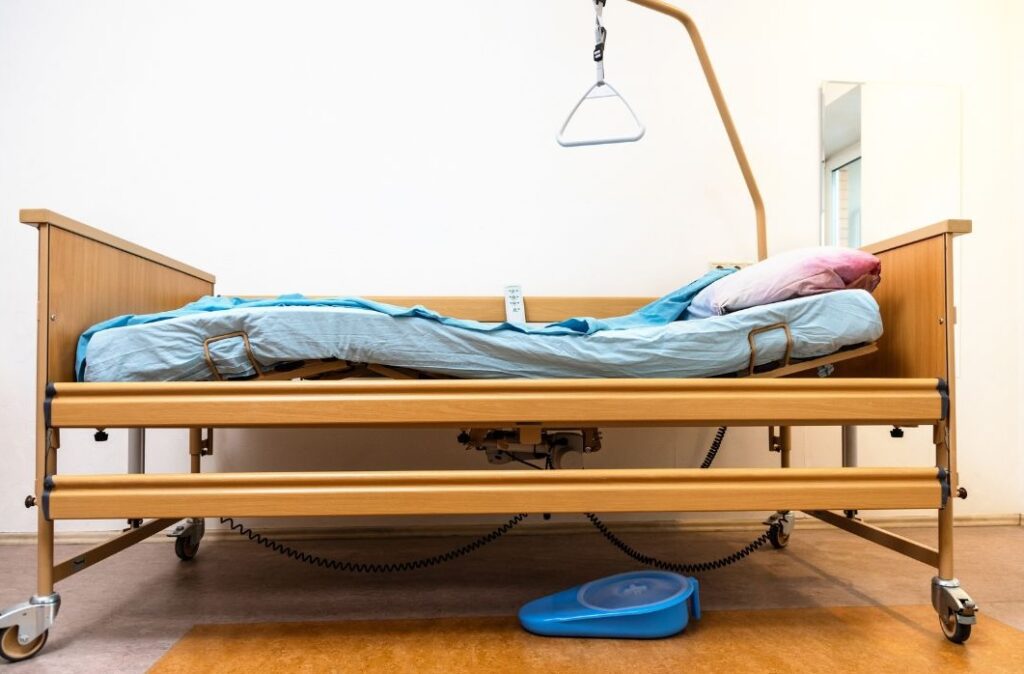Cerebral Palsy affects individuals in various ways, significantly impacting the daily lives of adults living with this condition.
The right adaptive equipment is paramount in fostering greater independence and enhancing the quality of life for those affected.
From an indispensable wheelchair, which offers mobility solutions, to the array of special equipment for Cerebral Palsy designed for communication and routine activities, these tools are lifelines that empower individuals to navigate their world with fewer barriers.
This guide aims to enlighten families and live-in carers on the myriad of adaptive equipment available, encouraging the exploration of options that best suit the unique requirements of their loved ones.
Emphasising Cerebral Palsy care through tailored aids, we invite you to discover how these innovations can transform everyday challenges into achievable tasks, promoting a more inclusive and accessible lifestyle for adults with Cerebral Palsy.
Wheelchair
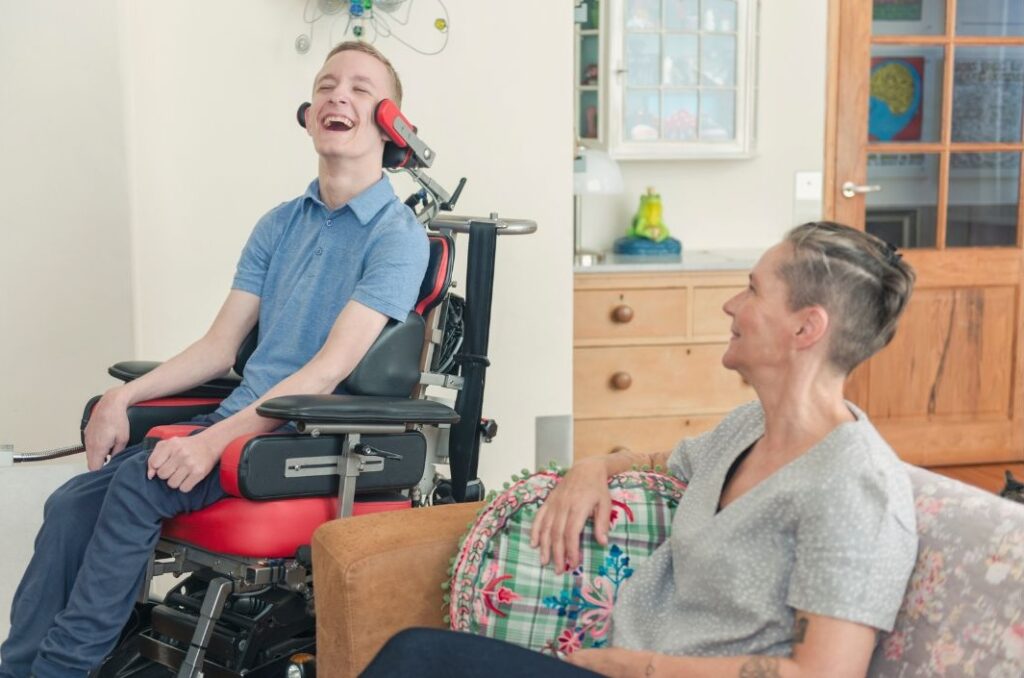
Selecting a wheelchair for an adult with Cerebral Palsy is crucial in enhancing mobility and ensuring comfort.
Whether it’s a manual or powered Cerebral Palsy wheelchair, each type offers unique benefits tailored to the individual’s needs and lifestyle. Beyond the basic choice, customisation is key.
Adjustable backrests, seat cushions, and head supports are vital for providing the necessary support and comfort, making the wheelchair an extension of the user’s body.
In addition, standing equipment for Cerebral Palsy can complement wheelchair use, promoting upright posture and strengthening.
When considering equipment for Cerebral Palsy, remember maintenance and safety are paramount.
Regular checks and adherence to safety guidelines ensure the longevity and safe use of Cerebral Palsy mobility equipment, empowering users to navigate their world with confidence and ease.
Universal Cuff
The universal cuff stands out as an ingeniously simple yet profoundly impactful tool for individuals experiencing limited hand function, dramatically enhancing their capability to perform everyday tasks.
This adaptive device, which can be securely fastened around the hand or wrist, features a slot or clasp designed to hold utensils, pens, or other small items.
This functionality significantly simplifies activities such as eating, writing, and manipulating various objects, thereby facilitating a higher degree of ease and independence in daily life.
When choosing the ideal universal cuff, it is crucial to pay attention to both the size and the material.
A properly fitting cuff is essential for ensuring it remains comfortably in place without causing discomfort or constriction.
The selection of materials is equally important, with a preference for those that are gentle on the skin, thus guaranteeing the cuff’s reliability and comfort over extended periods of use.
By empowering users to carry out tasks on their own, the universal cuff fosters a profound sense of autonomy and confidence, making it an invaluable component in the toolkit of adaptive devices.
Its simplicity belies its transformative potential, making everyday activities more accessible and manageable for those with limited hand function.
Crutches
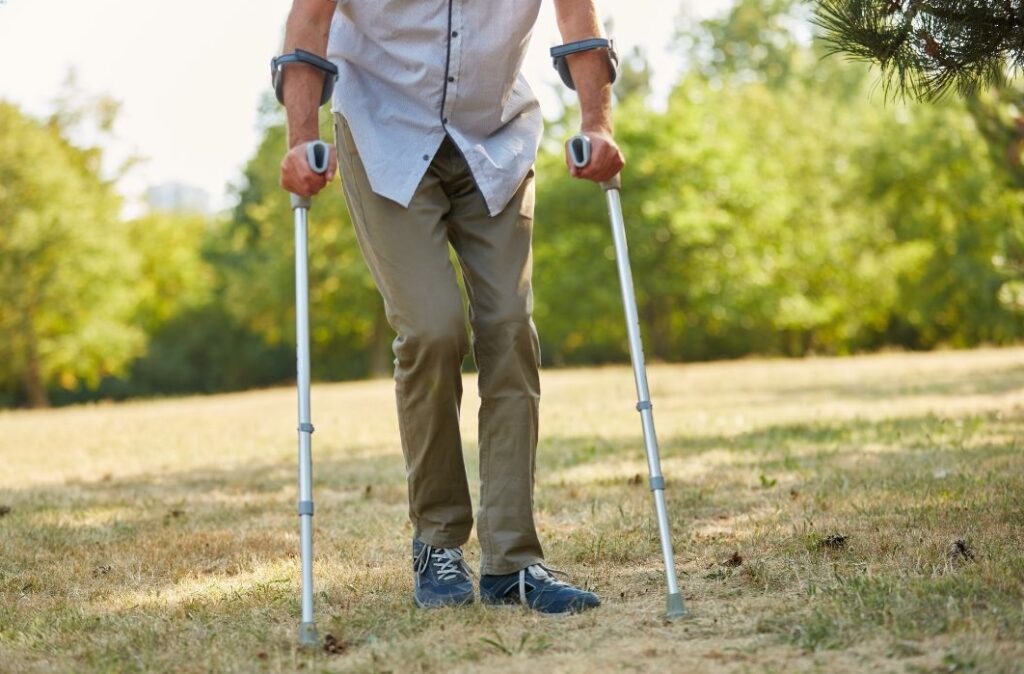
Navigating the world with Cerebral Palsy requires adaptable solutions, and crutches offer practical support for many adults.
There are various styles to consider, each with its benefits: forearm crutches for those seeking greater manoeuvrability, underarm crutches for temporary support, and platform crutches for individuals requiring additional forearm support.
Mastering the correct technique is key to enhancing mobility while minimising the risk of injury.
Proper adjustment is equally important. It ensures the crutches are tailored to the individual’s height and strength can dramatically improve comfort and effectiveness.
Regular maintenance, such as checking the rubber tips for wear and ensuring screws are tight, will keep the crutches in top condition.
With the right pair of crutches, adults with Cerebral Palsy can enjoy greater freedom and independence in their daily activities.
Standers
Standers are crucial for adults with Cerebral Palsy, enabling weight-bearing activities vital for bone health.
They come in various styles: prone standers for front support, supine for back support, and sit-to-stand for flexible transitions.
Key considerations in selecting a stander include its adjustability to accommodate growth and changing needs, support features for stability and comfort, and ensuring it suits the user’s preferences.
The right stander not only promotes physical health but also enhances the user’s independence and engagement in daily activities, making it a vital component of adaptive equipment for Cerebral Palsy care.
Splints
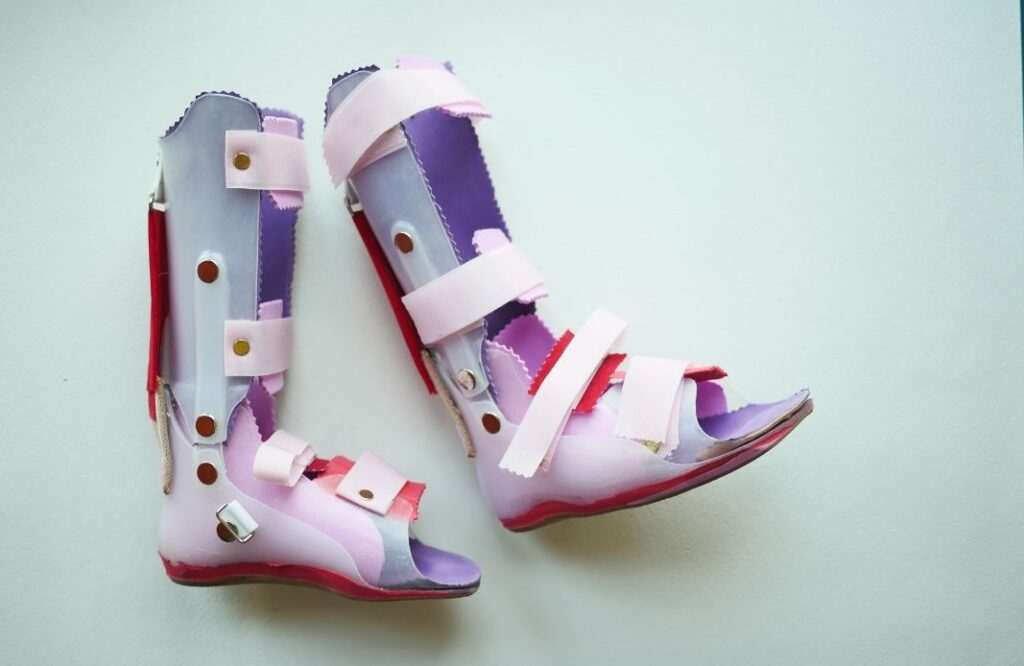
Splints serve a vital role in managing spasticity for adults with Cerebral Palsy, significantly improving the functional use of their limbs by stabilising joints and aiding muscle alignment.
The choice between custom-made and off-the-shelf splints hinges on individual needs: custom splints are precisely tailored, offering unmatched support and fit, whereas off-the-shelf versions provide immediacy and cost savings.
Ensuring the effectiveness and hygiene of these splints requires diligent care, including regular cleaning and adjustment checks. This maintains their condition but also safeguards against skin issues, making splints a cornerstone in enhancing daily function and comfort.
Ankle Foot Orthosis
Ankle-foot orthoses (AFOs) are important in assisting adults with Cerebral Palsy in walking and maintaining stability.
By supporting the ankle and foot, AFOs enhance mobility and foster independence.
There are several types of AFOs available, each designed to meet specific needs—ranging from rigid models that provide maximum support to flexible ones that allow for some movement.
Selecting the right AFO involves understanding the user’s mobility challenges and goals. For new AFO users, a gradual wearing schedule is recommended to allow the body to adjust comfortably.
Over time, adjustments may be needed to ensure the AFO continues to meet the user’s needs effectively and comfortably.
This careful integration and adjustment period is crucial for maximising the benefits of AFOs in daily life.
Hoists
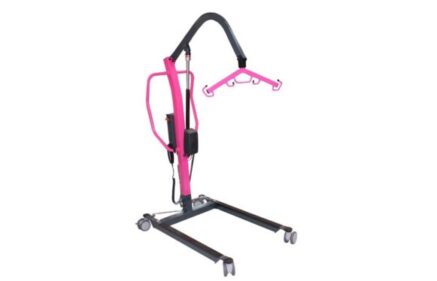
Utilising a hoist for transfers significantly reduces the risk of injury, safeguarding both adults with Cerebral Palsy and their live-in carers during movement.
There are different types of hoists available, including ceiling hoists, portable hoists, and bath hoists, each serving a unique transfer need.
Each type serves specific scenarios, enhancing safety and ease. Adhering to safety procedures and undergoing proper training are paramount for secure hoist operation.
This ensures not only the well-being of the user but also fosters a supportive and safe environment for live-in carers, making daily care routines more manageable and less physically demanding.
Shower Chair
A shower chair is crucial in providing a secure and accessible bathing solution for adults with Cerebral Palsy, significantly enhancing their safety and autonomy in the bathroom.
When selecting a shower chair, several factors should be carefully considered. Size is the most important factor to ensure the chair fits snugly within the shower space.
Adjustability is also key for tailoring the chair to the user’s specific needs. Additionally, the choice of material is important, as it is preferable to use durable, water-resistant options that can withstand regular use.
Before each use, it’s essential to verify the chair’s stability to mitigate the risk of slips and falls, adjusting the height as needed to accommodate the user’s comfort and safety.
Furthermore, regular maintenance is critical in prolonging the life of the shower chair.
This includes routine cleaning to prevent the buildup of mould and mildew.
By adhering to these practices, the shower chair remains a reliable and comfortable part of the user’s bathing routine, ensuring both safety and hygiene are maintained to the highest standard.
Hospital Bed with Adjustable Height
Adjustable hospital beds are a boon in home care settings, offering unmatched comfort and meeting the medical needs of adults with Cerebral Palsy.
These beds allow for easy adjustment of the head, feet, and overall height, ensuring optimal comfort and aiding in various medical requirements.
Key features include the ease of adjustment, perhaps through remote control for convenience, and the presence of side rails for added safety.
Proper positioning is crucial to prevent falls and mitigate the risk of pressure sores, with regular repositioning and the use of suitable mattresses.
Following these guidelines ensures the bed is a safe, comfortable haven, supporting health and well-being.
Body Support Systems
Body support systems offer tailored support for adults with Cerebral Palsy, enhancing comfort during activities and rest.
There are various assistive devices available, such as supportive vests, belts, and specialised seating solutions, each designed to improve stability and posture.
When selecting a body support system, it’s essential to consider the fit and adjustability to cater to individual needs.
Proper fitting ensures the support system offers the right balance of comfort and stability without restricting movement or causing discomfort.
Regular adjustments may be needed as the user’s requirements change over time, ensuring the support system continues to meet their needs effectively.
Such personalised support is crucial for promoting independence and participation in daily activities, making body support systems a key component of adaptive equipment.
Power Scooters
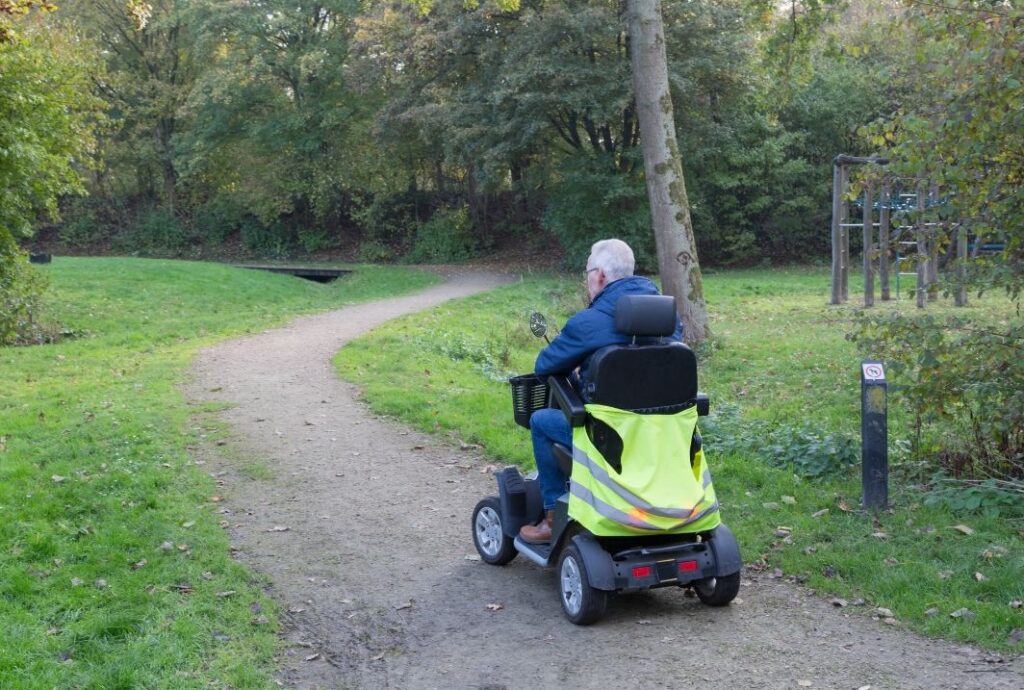
Power scooters stand as a beacon of freedom for adults with Cerebral Palsy, drastically enhancing their outdoor mobility and independence.
These devices unlock the ability to explore and actively engage with the community, offering a new lease on autonomy.
When choosing a power scooter, key considerations such as the longevity of battery life—to ensure it aligns with your travel ambitions, the scooter’s capability to manoeuvre through various terrains, and its portability for straightforward transportation, become paramount.
Familiarity with the scooter’s controls and functionalities is essential for safe operation.
Moreover, committing to regular maintenance routines, including attentive battery care and tyre inspections, underpins the scooter’s long-term dependability.
Such diligence ensures that these mobility aids remain ready and reliable for every adventure.
By carefully considering these aspects, adults with Cerebral Palsy are empowered to confidently take on outdoor activities, broadening their social interactions and fostering greater independence.
Power scooters thus not only offer a practical mobility solution but also enrich the lives of users, allowing them to explore the world around them with confidence and ease.
In House Lifts
In-house lifts play a pivotal role in enhancing mobility for adults with Cerebral Palsy, facilitating access across different levels of the home with ease and dignity.
Platform lifts, chair lifts, and ceiling lifts each offer unique advantages depending on space availability and user needs.
Platform lifts accommodate wheelchairs directly, chair lifts are ideal for seated transfers on staircases, and ceiling lifts maximise floor space by utilising overhead tracks.
When installing any lift, consider the structural requirements of your home, alongside essential safety features such as emergency stop buttons and battery backup systems, to ensure reliable and safe operation.
Thoughtful installation and adherence to safety protocols can significantly improve the quality of life, making every corner of the home accessible.
Stair Lift
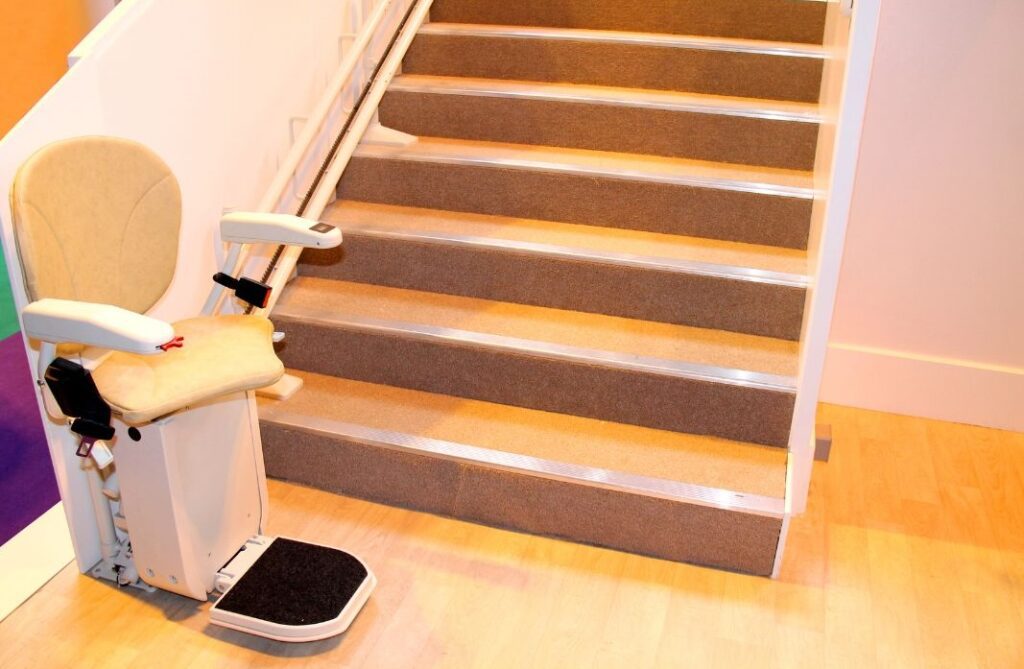
Stair lifts play a crucial role for individuals with Cerebral Palsy, enabling them to navigate multi-level homes with ease and maintain their independence.
Choosing the right stair lift involves assessing your home’s staircase type—be it straight or curved—and matching it with the user’s unique requirements, such as opting for models with a swivel seat for easier transfers or adjustable footrests for added comfort.
Professional installation is vital to ensure the lift is securely attached to the staircase, providing a smooth and reliable operation.
Safety features are essential for each user. Some of the key features include seat belts to offer added security, obstruction sensors that prevent accidents by stopping the lift if an obstacle is detected, and emergency stop buttons that allow the user to halt the lift instantly if needed.
These features contribute to a safe and comfortable experience, enhancing the user’s ability to move freely between floors.
Stairlifts, with their blend of functionality and safety, are indispensable in making multi-level living accessible and enjoyable for those with Cerebral Palsy.
Communication Devices
Communication devices offer a lifeline for adults with Cerebral Palsy facing speech difficulties, enabling them to express themselves and interact with the world around them.
Ranging from basic picture boards that allow for simple, visual communication, to sophisticated speech-generating devices equipped with customisable vocabulary and voice options, these tools cater to diverse needs and preferences.
Training is essential to maximise the potential of these devices, with customisation options ensuring they are tailored to the individual’s specific communication requirements.
By embracing these technologies, users can overcome barriers to speech, fostering greater independence and enhancing their ability to connect with others.
Commode
A commode plays a crucial role in providing a safe and accessible toileting solution for adults with Cerebral Palsy, ensuring dignity and independence in their daily care routine.
When choosing a commode, key features to look for include height adjustability for tailored comfort, portability to allow use in convenient locations, and ease of cleaning to maintain hygiene.
To ensure optimal hygiene and comfort, regular cleaning with appropriate disinfectants is essential, alongside the use of comfortable seating materials that can be easily washed.
Adhering to these best practices not only promotes cleanliness but also enhances user comfort and well-being, making the commode an indispensable part of personal care equipment.
Selecting the right adaptive equipment is pivotal in enhancing the lives of adults with Cerebral Palsy, offering them greater independence and quality of life.
IP Live-in Care specialises in this area, expertly matching clients with carers who not only offer professional support but also share similar interests, fostering a deeper connection.
We encourage families and live-in carers to reach out for assistance, ensuring their loved ones receive the best possible care and equipment tailored to their needs.
IP Live-in Care is here to guide you every step of the way.

